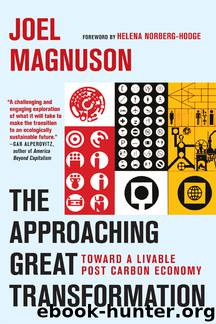The Approaching Great Transformation by Joel Magnuson

Author:Joel Magnuson
Language: eng
Format: epub
Tags: Public Policy / Environmental Policy
Publisher: Seven Stories Press
Published: 2013-04-08T16:00:00+00:00
The Early British Meta-Economists
This legacy of meta-economists and visionaries begins with John Ruskin. Ruskin was a mid-19th century British art critic and writer who covered art and architecture, culture, and economics. He was also a social reformer and sought justice for working people, though his sense of justice was unlike that of other social reformers of that period as it was tied to artistic expression rather than party politics. He believed artistic expression is also bound to spiritual well-being. Work, aesthetics, and spiritual fulfillment are, for Ruskin, one and the same. He saw that humans can rectify their suffering by looking inward to see both their ignorance and their inherent capabilities. If people overcome ignorance, cultivate their capabilities, and bring those capabilities into society, society will become a better place to live. But remaining in a state of ignorance thwarts personal development, and as the individual remains stunted, so does society. For Ruskin, fully developing our inherent abilities is to foster creativity and expressiveness in work. Work is necessary for life, but it is not only the fruits of our labor that give us joy. Ruskin saw that there is joy in the work itself as we have the innate capability to do it with creativity and artistic sensibilities.
Ruskin’s early work was mostly preoccupied with art and architecture. He felt that great art must be done with a sense of joy, but that sense of joy is as much social as it is personal. The artist must have a sense of personal freedom as well as a sense of belonging to a community and being appreciated by the community. Ruskin also held steadfast to the belief that authentic artistic expression must convey a deep understanding of truth and nature. Truth is derived from well-developed human capacities and not from learning in the conventional sense. The artist or artisan must have the mastery of his medium, and his ability to convey truth is inseparable from a moral and spiritual outlook. That is, for Ruskin, genuine art is not created from “taste” as it was seen in traditional highbrow culture, rather it involves the entire moral, spiritual, and creative person. For both the artist who creates the work and the person who perceives it, true art involves emotion, intellect, morals, spirituality, and other human capacities.
In Ruskin’s view, great art must also come from an understanding of natural, organic forms. He contended that all organic forms, including human beings, are at the height of their potential beauty when they are allowed to develop perfectly according to their innate laws of growth. He saw organic forms existing in a state of interdependence. A plant living in nature requires the help of insects, birds, and other plants for it to become wholly developed. If any one of these elements is removed or destroyed, the plant will be stunted in its development and will not be able to reach its full potential for beauty.
Ruskin criticized the fashions of modern art for their failure to portray such organic interconnectedness.
Download
This site does not store any files on its server. We only index and link to content provided by other sites. Please contact the content providers to delete copyright contents if any and email us, we'll remove relevant links or contents immediately.
| Automotive | Engineering |
| Transportation |
Whiskies Galore by Ian Buxton(41982)
Introduction to Aircraft Design (Cambridge Aerospace Series) by John P. Fielding(33113)
Small Unmanned Fixed-wing Aircraft Design by Andrew J. Keane Andras Sobester James P. Scanlan & András Sóbester & James P. Scanlan(32788)
Craft Beer for the Homebrewer by Michael Agnew(18228)
Turbulence by E. J. Noyes(8037)
The Complete Stick Figure Physics Tutorials by Allen Sarah(7361)
Kaplan MCAT General Chemistry Review by Kaplan(6922)
The Thirst by Nesbo Jo(6921)
Bad Blood by John Carreyrou(6608)
Modelling of Convective Heat and Mass Transfer in Rotating Flows by Igor V. Shevchuk(6427)
Learning SQL by Alan Beaulieu(6274)
Weapons of Math Destruction by Cathy O'Neil(6260)
Man-made Catastrophes and Risk Information Concealment by Dmitry Chernov & Didier Sornette(6001)
Digital Minimalism by Cal Newport;(5745)
Life 3.0: Being Human in the Age of Artificial Intelligence by Tegmark Max(5541)
iGen by Jean M. Twenge(5405)
Secrets of Antigravity Propulsion: Tesla, UFOs, and Classified Aerospace Technology by Ph.D. Paul A. Laviolette(5364)
Design of Trajectory Optimization Approach for Space Maneuver Vehicle Skip Entry Problems by Runqi Chai & Al Savvaris & Antonios Tsourdos & Senchun Chai(5062)
Pale Blue Dot by Carl Sagan(4993)
